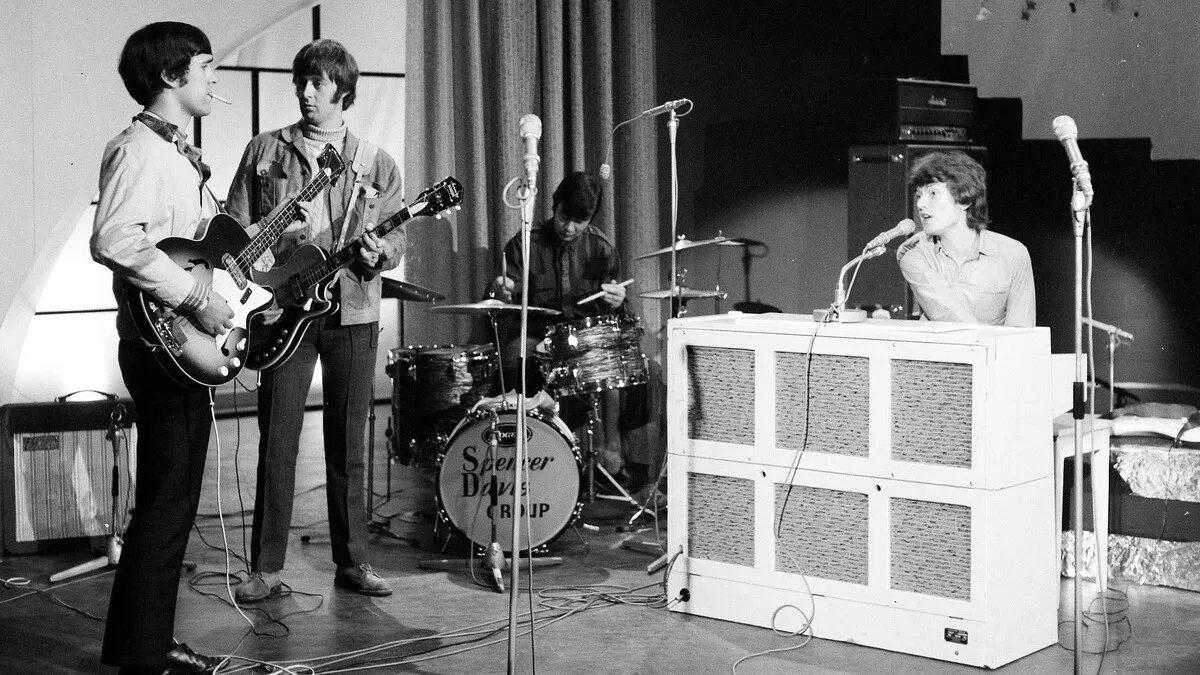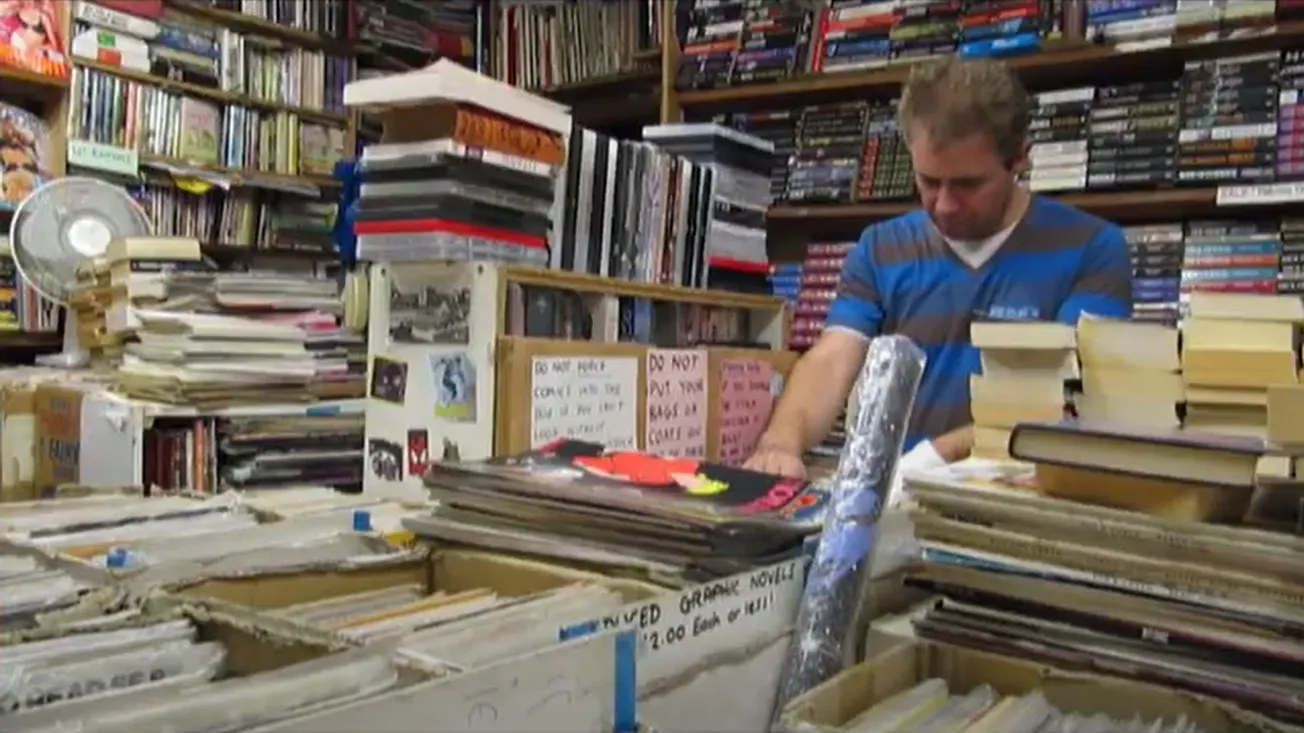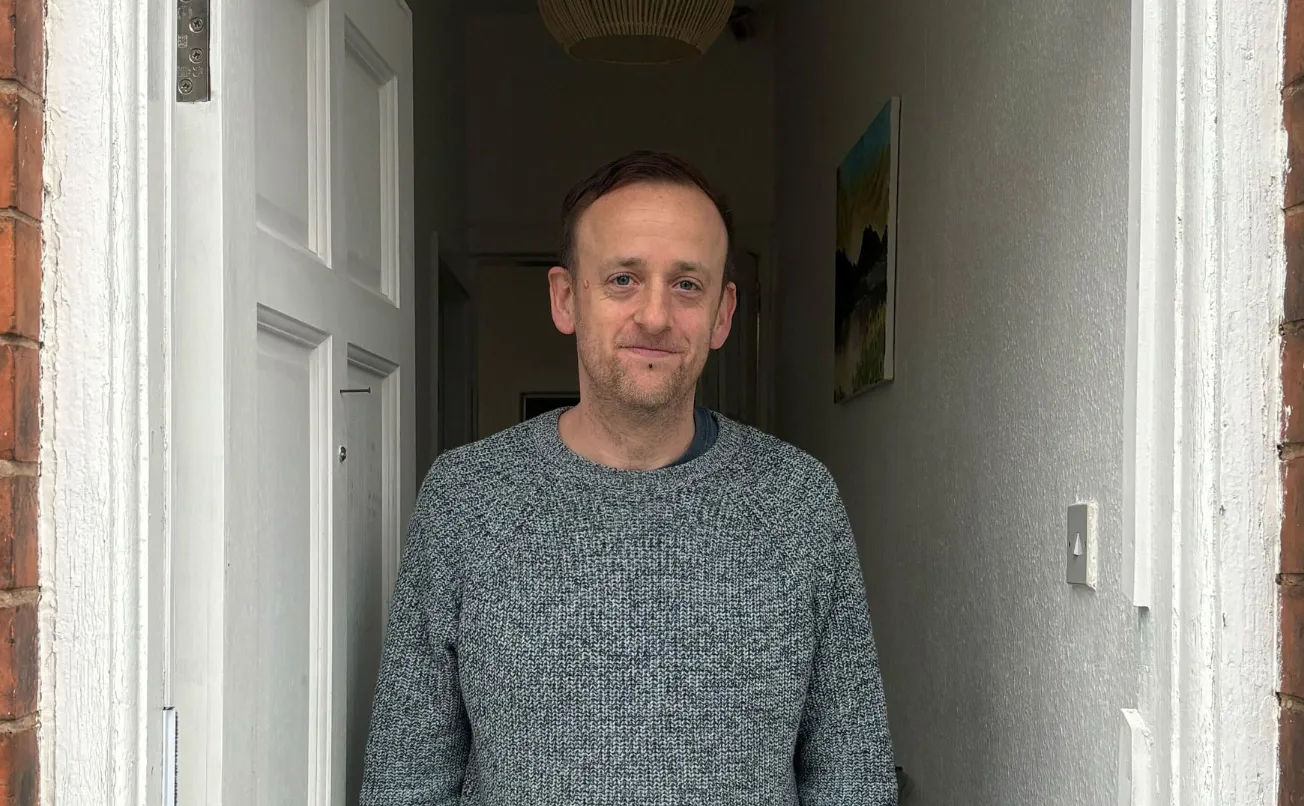Dear Patchers — Today’s Dispatch explores the underacknowledged legacy of Birmingham musician Steve Winwood: guitarist, singer and mastermind behind 1960s stalwarts The Spencer Davis Group and Traffic. Winwood, a Kingstanding boy, grew up to play with, and influence, almost all the major guitarists and singer-songwriters of the 1960s, including Jimi Hendrix, Bob Dylan and The Beatles. He also made the career, and fortune, of Island Records mogul Chris Blackwell.
So why is Birmingham so keen to celebrate other bands, such as Black Sabbath, and not Winwood? Is it because Black Sabbath invented a Birmingham-born-and-bred genre: Heavy Metal? Or is it because Winwood’s career was so varied and indigestible, spanning blues, R&B, rock n roll, 1980s synth pop and prog?
In today’s Dispatch, writer Jon Neale sets out to tell us why Winwood has been overlooked by his city. In the process, he uncovers a web of rock royalty, influenced by Birmingham’s pubs, clubs and concert halls — many directly because of Winwood’s musical output.
But first, some things to do.
Things to do
🪔 Celebrate Diwali, the festival of light today at 1pm at the Symphony Hall. Shin Parwana will perform a popular mix of Bollywood classics and Punjabi ghazals alongside acclaimed Indian vocalist Priti Kaur. Tickets are a modest £5-8.
🖼️ If you’ve trawled BMAG’s Victorian Radicals exhibition several times over and are craving more Pre-Raphaelite content, head to the Barber Institute of Fine Art for an exhibition exploring the role of scent in paintings by artists of the Pre-Raphaelite and Aesthetic movements. This one won’t cost you a penny.
🎶 One for the diary: The City of Birmingham Choir — best known for their beloved annual Christmas performance of Handel’s Messiah — launches a new season of concerts on Sunday 17 November with a rendition of Mozart’s Mass in C minor. Alongside this masterpiece, enjoy contemporary composer Cecilia McDowall’s tribute Da Vinci Requiem, which was written in 2019 to mark the fifth centenary of the great artist’s death. Tickets from £10, children go free.
Steve Winwood — Birmingham’s overlooked bard
By Jon Neale
Sometime in the mid-1960s, Island Records founder Chris Blackwell was staying overnight in Birmingham. He’d managed to turn teenage Jamaican singer Millie Small into a star with the single ‘My Boy Lollipop’ — the first ska track to go mainstream. She was filming for Thank Your Lucky Stars, the teatime pop show that preceded Top of The Pops, at the Alpha Studios in Aston.
Later that night, Blackwell was taken to see an early version of the band The Move, called Carl Wayne & the Vikings. Unimpressed with the group’s sharp suits, and polished, ‘showbiz’ performance, Blackwell headed to another venue: the Golden Eagle pub on Hill Street. He was warned that the band playing might not be to his taste, that they might be “a bit different.” This would be Blackwell’s introduction to a remarkable teenage prodigy, perhaps the greatest musical talent Birmingham has ever produced. It would be an encounter that would shape Britain’s music scene for the following decade.
As Blackwell climbed the Golden Eagle’s stairs, he heard a voice which could only be described as “Ray Charles on helium”. He was immediately absorbed by the “incredible” musicianship on display. “On this stage was this skinny white kid with floppy hair, about 16, the same age as Millie Small, playing guitar and sometimes amazing keyboards as well, like it was second nature… I’d never heard anything like it — white boys playing the blues like it meant the world to them,” he would later recall.

The skinny white kid in question was Stephen (Steve) Lawrence Winwood, of Atlantic Road, Kingstanding. He became one of the most celebrated musicians of the 1960s and 1970s: moving between the worlds of R&B, blues, psychedelia, jazz and folk — playing on albums such as Jimi Hendrix’s Electric Ladyland and Lou Reed’s Berlin. Winwood topped the charts with the Spencer Davis Group and defined the shape of the 1970s rock album with his band Traffic, before reinventing himself as a very different sort of pop star in the 1980s.
YouTube is a good place to appreciate how startling seeing the teenage Winwood must have been, in particular the clip of the Spencer Davis Group performing the song ‘Georgia on My Mind.’ It seems almost impossible that an 18-year-old is making that sound, especially while executing a virtuoso Hammond organ performance. But what is equally remarkable, aside from his precocious musical talents, is how little Birmingham, his native city, remembers him. There is no Steve Winwood bridge or Traffic-related sculpture in Victoria Square. Asked in the street, older Brummies would probably mention a few other artists before getting to him.
This indifference from Brummies might be understandable if Winwood had left early on to pursue fame in London. But his musical roots are entirely in the city, from Perry Barr choirboy to stoned hippie performing at Erdington’s legendary Mothers. Both his major bands were formed, and had their debut gigs, locally: featuring either Birmingham natives or those long-immersed in the city’s vibrant scene. And it’s not as if he is forgotten globally either: ‘Dear Mr Fantasy’ was heard by millions a few years ago at the start of the film Avengers Endgame.
Shortly after the Golden Eagle gig, Blackwell would sign “The Rhythm and Blues Quartet”, quickly renamed the Spencer Davis Group after the oldest and most eloquent member, Spencer Davis. Blackwell had been watching Brian Epstein and Andrew Loog Oldham — managers of The Beatles and The Rolling Stones respectively — and would apply what he had learnt to his new signings. The Spencer Davis Group produced some of the most era-defining singles of the mid-1960s. Their breakthrough single, ‘Keep On Running,’ a cover of a song by Jamaican singer Jackie Edwards, knocked The Beatles’ ‘Day Tripper’ off the number one spot in 1966 when Winwood was still 17. This success allowed Blackwell to repay the loan he had taken out to launch the group using Island Records as collateral. This was just the start for Blackwell — the later, self-penned singles ‘Gimme Some Lovin’ and ‘I’m a Man’ by the Spencer Davis Group would prove transatlantic hits.
That night in the Golden Eagle pub was not just pivotal for Blackwell’s bank balance. As Blackwell wrote in his autobiography The Islander (2022), the night “marked the birth of the new Island Records, out of Jamaica and now very much part of the emerging English scene.” Blackwell, reflecting on his chance encounter with Winwood at the Golden Eagle, declares his astonishment at how it was possible to: “find yourself in Birmingham on a Monday night in May… and come across something that will change your life.”

This early success not only bankrolled Island Records. According to Blackwell, Winwood was so respected and loved across Britain’s musical underground that his addition drew other acts to the label. Winwood’s aura helped Island nurture acts such as John Martyn, Nick Drake and Fairport Convention, through Bob Marley & the Wailers, Steel Pulse and Toots & the Maytals, to Sparks and Roxy Music.
Winwood and Blackwell’s spontaneous meeting must be one of the defining moments in Birmingham's music history. It doesn’t help that the pub was — in true Brummie fashion — demolished in the 1980s. The lack of interest in a city that likes the ‘salt of the earth’, might be understandable if Winwood was from an elevated background. But superficially, at least, he was as commonplace as they come. Winwood grew up in a modest semi-detached house in Kingstanding and went to Great Barr School, one of the first comprehensives, while his father Lawrence worked hard shifts at a foundry.
Because Lawrence Winwood also moonlighted as a relatively successful band leader, saxophonist and clarinetist, the house was full of instruments which Steve was encouraged to play. While still a choirboy at St John’s Church in Perry Barr, he played short cameos with his older brother Mervyn (‘Muff’) in his father’s band. They would introduce increasingly popular rock ‘n’ roll numbers and guitars to their Dad’s trad-jazz set.
Spencer Davis, a twentysomething Welshman who had studied at the University of Birmingham, was already a seasoned blues performer. Davis saw the Winwood brothers playing one night and convinced the pair to join his band: the Rhythm & Blues Quartet. Davis’s band gained a local following and slots at venues throughout the West Midlands. Winwood often performed with his back to the audience, hiding the fact he was well under 18. This didn’t stop him from playing in the backing bands of American blues artists such as Muddy Waters, Howlin’ Wolf, John Lee Hooker and Bo Diddley when they came to Birmingham. It was typical, at the time, for these grizzled bluesmen to tour Europe solo acquiring band members when they arrived.
What makes Brum’s indifference to this teenage prodigy even more strange is that he is perhaps the most emblematic product of one of the most creative periods in the city’s history. The mid to late 1960s was a select period, much like the ska/reggae boom of the 1970s, when Birmingham had a nationally recognised ‘scene’. In those days, it was an affluent place; unlike most of the UK’s northern cities, Birmingham’s industries were booming, and young people were moving there from all over the country and beyond. Factory work was almost guaranteed, perhaps alongside a semi in one of the still-new estates like Kingstanding. But with few real other options for ordinary people, joining a band — which paid more if you were successful — was, understandably, tempting. With full employment, high wages and a young population, though, there was also a ready audience for gigs.
‘Brum Beat’ was second only to London and Liverpool, with the latter arguably only in the running because of The Beatles. This melting pot would produce The Move, The Moody Blues and The Idle Race — ELO frontman Jeff Lynne’s first band — as well as the early careers of Led Zeppelin’s Robert Plant and John Bonham and Christine née Perfect, who would later become an international superstar as Fleetwood Mac’s Christine McVie. But it was the Spencer Davis Group that had the greatest and most concentrated period of success. Their singles are the distilled sound of that era, a testament to how optimistic and vibrant — even funky — Birmingham briefly was. Winwood’s voice and Hammond organ found their place at the heart of it.

Winwood’s subsequent career should also be celebrated by Birmingham. The Spencer Davis Group had already become part of the ‘British invasion’ of the American pop charts and had (unwisely) starred in a cheesy comedy film: The Ghost Goes Gear. At the same time, Steve was hanging around with the likes of The Beatles, The Rolling Stones and Cream. Both Jimi Hendrix and Eric Clapton admired him and planned at various points to conscript him into their respective bands.
When Bob Dylan played a gig at Birmingham Town Hall in 1965, he asked to meet Winwood, wanting to find out ‘how the hell’ he managed to sing and play like that. Dylan ended up jamming with Winwood & Co at Aston’s Elbow Room — a famous late-night hang-out for local musicians, which also seemed to have colourful connections with London gangsters such as the Kray Twins — before heading to Witley Court in Worcestershire on a surreal ghosthunting mission.
The tension between Dylan’s ‘underground’ world and the pop stardom planned for Winwood by Blackwell was already there. As 1966 turned into 1967, and the Beatles’ Revolver and the Beach Boys’ Pet Sounds were released, that tension must have grown. The boundaries of popular music were expanding, and psychedelia and experimentation were the order of the day. Winwood — now just 19 years old — turned his back on the Spencer Davis Group. ‘I’m a Man’, in early 1967, would be the last single they would release, much to Island Records’ chagrin. But despite Blackwell’s attempts to steer him in a more commercial direction, the quietly headstrong Winwood decided on a very different sort of project.
Gigging in Hamburg a few months earlier, Winwood had met fellow Midlanders Dave Mason and Jim Capaldi. They had already been in bands in their native Worcester and seemed to hit it off musically with Winwood. When they all returned home, they jammed at the Elbow Room with Steve’s friend, Quinton-born multi-instrumentalist Chris Wood, whose sister Stephanie had designed clothes for the Spencer Davis Group. Traffic had been born, and within a few weeks, they held their debut gig at Mother’s, a club above a carpet shop in Erdington which was twice voted the best venue in the world by the US magazine Billboard. Despite early misgivings, the record producer Blackwell would continue supporting Traffic, seeing Winwood as the core of his label which would, in due course, drag Island Records into the heart of the counterculture.
The newly formed Traffic did not stay in the city. Perhaps inspired by the mostly American musicians who gathered in California’s Laurel Canyon, Winwood’s new band decided to move to a communal cottage in Berkshire, starting a trend of ‘getting it together in the country’ that would become standard in British rock. Traffic would do little at the cottage but jam, write songs, smoke weed and receive illustrious guests such as Pete Townshend of The Who, Joe Cocker, Steven Stills (of Buffalo Springfield and later Crosby, Stills & Nash) and the photographer Linda Eastman (later McCartney), as well as fellow brummies Denny Laine and Trevor Burton.

Traffic would gain almost instant success and critical acclaim. Their first album, Mr Fantasy, reached number 16 in the UK and 88 in the US. However, it was their second, eponymous release that would prove more successful transatlantically — top 10 here, and top 20 on the other side of the pond. They were “one of the most perfect musical groups in the world”, according to Rolling Stone magazine. Their debut London gig saw The Rolling Stones’ Brian Jones, Jimi Hendrix and Paul McCartney in the crowd — with the latter telling Muff Winwood the next day that Traffic was ‘the most interesting group around’. Traffic’s members duly made a short cameo in The Beatles’ album The Magical Mystery Tour (1967).
On a later US tour, Winwood and Traffic were given a warm reception by the cream of the US underground, including the Grateful Dead. On the same tour, the Jimi Hendrix Experience would recruit various Traffic members to play on Electric Ladyland (1968). Winwood provided the keyboards on ‘Voodoo Chile,’ Dave Mason played guitar on ‘All Along the Watchtower’ and sang backing vocals for ‘Crosstown Traffic,’ and Chris Wood’s flute popped up in the Hendrix song ‘1983... (A Merman I Should Turn to Be).’
Traffic was, for a moment, up there with the rock n roll greats, defining the new era of the rock album. But for the wider British public, Traffic was most famous for Dave Mason’s ‘Hole in My Shoe.’ Practically a novelty single, it reached number two in the UK charts and defined the band for many Brits, despite being completely atypical of Traffic’s work. The UK audience’s love of the eccentricity of ‘Hole in My Shoe’ was reinforced more than a decade later when Nigel Planar, in character as the depressed hippie Neil of The Young Ones, recorded it as a single, which coincidentally also reached number two.
The rest of the band hated the single, and it magnified the ongoing split with Mason. He was duly sacked, although he would pop up occasionally on later albums. Weeks later, Winwood would repeat his trick of leaving just as things were getting interesting. Shortly after his exit, Winwood teamed up with long-term friend Eric Clapton and the tempestuous drummer Ginger Baker to form the band Blind Faith. The one eponymous album, that resulted from this ‘supergroup’ has some fine songs and great vocal performances, but it didn’t gel and was marred by one of the most ill-judged and notorious album covers of all time, featuring a naked 11-year-old girl (not Winwood’s choice; he is on record as hating it).
Nevertheless, this was, perhaps, the high point in Winwood’s reputation. The journalist Dylan Jones wrote in 2009 upon seeing the re-released film of their free gig in Hyde Park (the first ever): “Winwood is something of a revelation….. forget Elvis, forget Hendrix, forget Jim Morrison — for one day, 40 years ago, in the summer of 1969, Steve Winwood was the coolest man on God's earth.” At the time, Rolling Stone magazine was more scathing: “Everyone knows the secret, everyone knows the score, Stevie Winwood is a winner, Clapton is a bore.” This imbalance might explain why the Blind Faith project collapsed.
Winwood returned to the studio to begin recording a solo project that morphed into a reincarnation of Traffic. He persuaded Wood — still struggling with the death of his close friend Jimi Hendrix — and Capaldi to join him. The resulting record, John Barleycorn Must Die (1970), is arguably the band’s best, and set the tone for the second half of Traffic’s output.
John Barleycorn Must Die also set another trend for Traffic’s later years — generating more fame and acclaim in the US than at home. This unbalanced trans-Atlantic dynamic might, partly, explain Brum’s memory-holing of the band. The album peaked at five on the American billboard chart but only 11 in the UK. Traffic’s follow-up, The Low Spark of High-Heeled Boys (1971) failed to chart at all domestically, while it reached number seven in the US. Shoot Out At The Fantasy Factory (1973) also flopped in the UK, but reached number six in the US charts.

By this point — especially after the live album On the Road (1973) — the band began to appear tired, and the emergence of punk was challenging the apparently self-indulgent, overly technical nature of their output. Traffic was not really ‘prog’ — they were far too soul- and jazz-influenced for that — but they were part of the wave of ‘dinosaurs’ that the Sex Pistols and The Clash wanted to sweep away. Winwood in particular appears to have taken the new musical climate and its venom quite badly, feeling it was aimed at him, and retired to his Gloucestershire estate where he was increasingly living a parallel life as a country gentleman-come-farmer. (One neighbour, interviewed in the 2010 BBC Documentary English Soul, said: “I had never heard of Steve Winwood or Traffic. I'm not a rock lover, as such, well he's matured shall I say into a country squire, he's got two identities, music when he plays to all the masses and that, and a lovely retreat where he can walk his dogs.")
Winwood would, of course, return to music in the 1980s with a totally different sound and a wholly new level of platinum disc-winning commercial success. His solo album Arc of a Diver (1980) announced a new MTV-orientated direction, with synthesisers at the forefront and a much more poppy, if still soulful, sound. Written, produced and played entirely by Winwood, it was a return to form, while being very much of its time. This was followed by Taking Back the Night (1982) and Back in the High Life Again (1987), and hit singles such as ‘Higher Love’ and ‘Valerie.’
For some, it all felt a little false, including his brother Muff: “The Steve Winwood of the 1980s fitted the 1980s, but I’m not sure it fitted him. To me, it looked uncomfortable… I knew he would be struggling with it.” Personally, as someone whose musical tastes were shaped by the nineties, the trebly 80s production of those albums, featuring tinny drum sounds and cheesy, intrusive synthesiser riffs, is almost unbearable to listen to, as with so much from that era. And that’s before we get to the videos of the former countercultural icon dancing around in a double-breasted suit. Nevertheless, strip all that away and the ingredients that defined his earlier career are still there — there’s no denying the quality of some of the songs. And he was still attracting the cream of American musical talent as collaborators, this time Chaka Khan and Chic’s Nile Rodgers.
Looking over Winwood’s whole career, it’s not difficult to argue that he is the most successful and talented musician that Birmingham has ever produced. And while he’s never strongly identified with the city, his upbringing and his musical roots are very much here in the West Midlands. Indeed, his Brummie accent, though much milder than in the 1960s, is still there. The driving combination of soul and rock ‘n’ roll that Spencer Davis Group embodied can be traced through later Midlands acts like Dexy’s Midnight Runners, The Beat and The Charlatans. And as Paul Weller — whose 1993 album Wild Wood is something of a tribute to Winwood — argues in English Soul: “I love that thing with Traffic, mixing all these different types of music, jazz, folk, rock, soul and R&B…. blending it all together. It’s a pretty amazing thing, it’s very, very English sounding.” Or, as I would argue, Brummie sounding.
So why does Winwood feel under-celebrated compared to that other, later product of Brum Beat, Ozzy Osbourne? It’s easy to sum up why Black Sabbath matters: they gave birth to metal — a genre that, in its many iterations, now bestrides the world from Brazil to Japan. Winwood’s career, like his music, is longer and more convoluted, his influence just as profound but spread across different genres and periods. Indeed, the tangents, pauses and changes in Winwood’s life are ironically reminiscent of an overly long 70s concept album. His association with the Marmite-like Eric Clapton (whose notorious (if allegedly drug-caused) 1976 racist rant at the Birmingham Odeon inspired the Rock Against Racism movement) may also not have helped his later reputation in the city.
Combine this with the cheesy 80s pop star period, and it’s easy to see why Winwood might be a little problematic, a little hard for Birmingham to embrace in the way they have Osbourne (even if, in his 60s and early 70s guise, he was a lot cooler, let’s admit it). Strangely, living a life as a country gent in Gloucestershire somehow feels considerably less Brummie than Ozzy Osbourne living in an LA mansion in a city equally defined by its industry, scale, diversity and supercharged highways. (While some of Winwood’s children have followed him into music, others have become part of the establishment; one of his daughters is married to Ben Eliot, former Conservative chairman and nephew of Queen Camilla.)
There’s something about Heavy Metal and Black Sabbath in particular — its working-class associations, its unsubtle sound, its honesty and directness and the disdain it used to generate among the cognoscenti — that appeals to a working-class, industrial city that always wants to make itself out to be rougher and tougher than it is, or was (see the TV shows Peaky Blinders and This Town).
But Winwood represents another, underacknowledged and awkward, Birmingham: one that is softly spoken, self-effacing and self-deprecating, one that ploughs its furrow regardless of what the world thinks, constantly reinventing itself, with sometimes questionable results. In some ways, that’s a more honest identity. It’s time to celebrate that legacy and reclaim one of Britain’s finest musicians as our own.








Comments